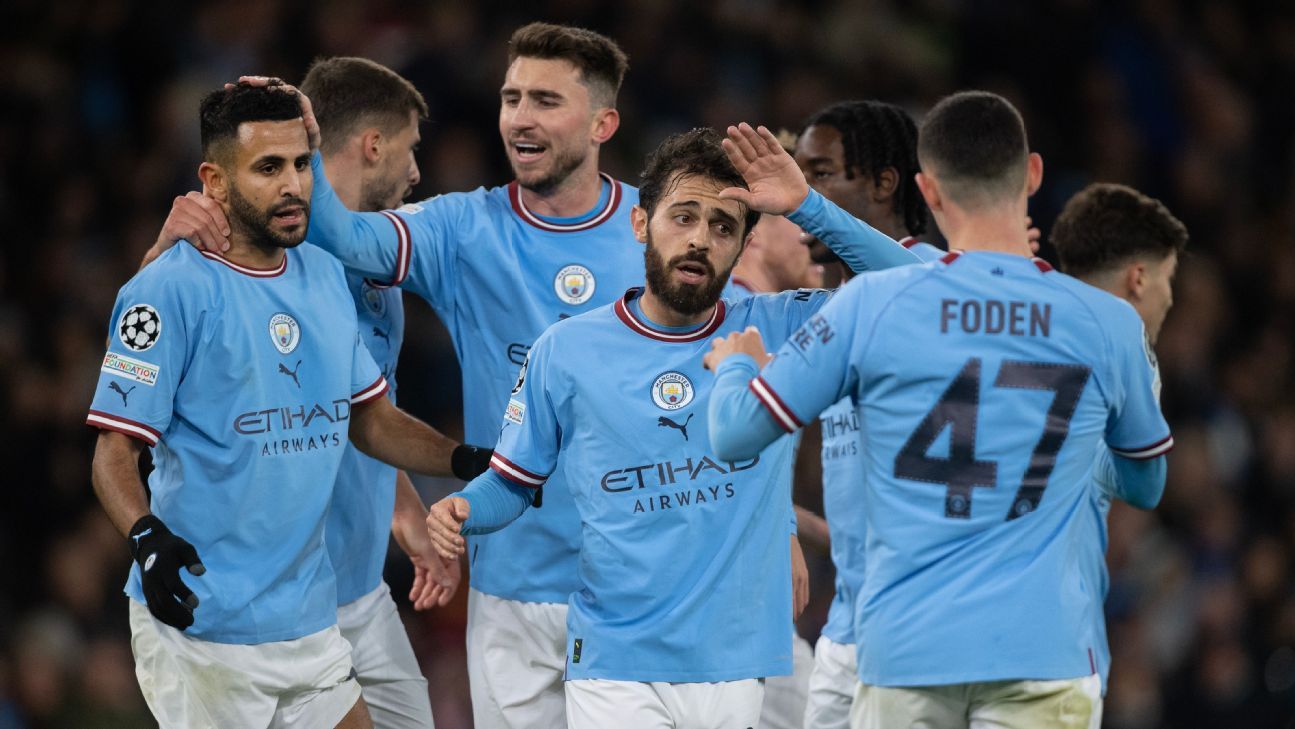The next time the Champions League becomes the dominant topic in soccer, we will be approaching Valentine’s Day. An entire World Cup will have come and gone. We’ll have spent many thousands of words talking about player wear and tear, particularly for players on the four teams that will have played seven matches in Qatar.
There is always a winter gap between the Champions League group stage and knockout rounds, but this one is going to feel immense. So before we wave a brief goodbye to the world’s biggest club competition, let’s take a valedictory look at what we just saw and what we’ll see when everything picks up again.
As far as group stages go, this one was pretty noteworthy. Napoli romped over supposed group favorites Liverpool and Ajax by a combined 14-4 over three matches, quickly clinching top spot in Group A. Club Brugge were nearly as exciting and creative in winning their first three matches and quickly clinching advancement.
– Stream on ESPN+: LaLiga, Bundesliga, MLS, more (U.S.)
LaLiga crashed and burned, with three of its four teams failing to advance — including not only Atletico Madrid but also Barcelona, who laid down huge chunks of future revenue to upgrade their team and contend again. In solidarity with their Super League brethren, Juventus fell apart as well.
Europa League champions Eintracht Frankfurt surprisingly advanced to the knockouts, taking each of their last two matches with winning goals from the electric Randal Kolo Muani. Chelsea fired Thomas Tuchel, engineer of their 2021 title, after a meek loss to Dinamo Zagreb in matchday one. Shakhtar Donetsk, without a home and without most of the stars from recent Europa League runs, had a chance to reach the last 16 with a win over RB Leipzig, only to lose 4-0 and finish third in the group. Celtic and Rangers combined to do very little damage but provided the tournament with some electric atmospheres at Celtic Park and Ibrox Stadium.
And then we were left with 16. The squads will change, form will evolve and injuries will shift expectations by the time we see these teams square off. But let’s rank teams as they currently stand after two grueling months. If UEFA were to decide, “You know what? Let’s just keep things rolling! The round of 16 starts next week!” who would the favorites be?
Tier 4: The rank outsiders
These three teams have achieved a good amount by getting here. They probably aren’t equipped for a long stay in the knockout rounds.
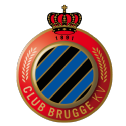
16. Club Brugge
Title odds, per FiveThirtyEight’s SPI: 1%
Title odds, per Caesars Sportsbook: +12500 (implied odds: 1%)
Best characteristic in group play: Extreme creativity
This tournament exposes you to a number of different exciting players and styles, and Brugge’s impossibly young attack — each of their five Champions League goal scorers are between 17 and 23 years old — was at its most energetic and creative in their 4-0 romp against Porto on Sept. 13. That win, plus their matchday three victory over Atletico Madrid, prompted their eventual advancement to the knockouts, the furthest they’ve gone in Europe’s top competition since reaching the round of 16 in 1989. (They needed only one win to reach said round that year.)
– Champions League talking points: Bayern’s ruthless run, group stage MVP, more
The goals quickly dried up — they were outscored 4-2 over the final four matches — as did their ability to create shots at any volume. They finished with the fourth-fewest shots per possession in the tournament. But they also finished fifth in xG per shot. Anything they created was fun and worthwhile.
Red flag: Simon Mignolet probably won’t continue to stand on his head
The wily veteran has been incredible in the tournament, stopping 88% of shots on goal and somehow keeping five clean sheets. Porto’s 4-0 revenge win on Oct. 26 was the only time something got through. He was unbelievable, and he allowed Brugge to advance despite opponents averaging more than twice as many shots per possession. As incredible as it would be for both Brugge’s and Mignolet’s runs to continue, I’m going to go out on a limb and predict that it won’t.
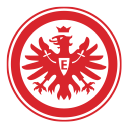
15. Eintracht Frankfurt
Title odds, per FiveThirtyEight’s SPI: 1%
Title odds, per Caesars Sportsbook: +10000 (implied odds: 1%)
Best characteristic in group play: They don’t let you shoot
You cannot beat Eintracht Frankfurt with elimination on the line. Die Adler took down Real Betis, Barcelona, West Ham United and Rangers on the way to last year’s Europa League title, and after laboring through four group stage matches, they needed two wins to advance… so they got two wins, beating both Marseille and Sporting by 2-1 scores.
After a loose first match with Sporting, they allowed zero or one goal in four of five matches, and their shot prevention averages put them in great company. Only four teams allowed 0.09 shots or fewer per possession in group play: Chelsea, Manchester City, Liverpool and Eintracht. They turned games into frantic and stingy affairs and navigated the waters better than opponents thanks to sturdy defense and timely creative contributions from Randal Kolo Muani, Daichi Kamada and the delightful Jesper Lindstrom.
Red flag: They can’t retain the ball
Here’s some less impressive company. Only four teams averaged 4.2 or fewer passes per possession: Rangers, Viktoria Plzen, Salzburg and Eintracht. Only one of those teams advanced. Eintracht had their aggressive moments, but possession was a problem. That’s not going to stop in the knockout rounds.
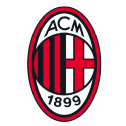
14. AC Milan
Title odds, per FiveThirtyEight’s SPI: 2%
Title odds, per Caesars Sportsbook: +5000 (implied odds: 2%)
Best characteristic in group play: A lack of weaknesses
I’ll be honest: Milan’s group stage stats really don’t stand out at all. They were neither good nor bad — in attack, they were 18th in shots per possession and 14th in xG per shot; in defense, they were 15th in shots allowed per possession and eighth in xG allowed per shot. Their goal differential was 10th-best, their xG differential 13th-best. They were one of the 16 best teams in this tournament and therefore advanced.
They were also capable of exploiting enough weaknesses against FC Salzburg and Dinamo Zagreb that they advanced despite getting swept by Chelsea. Stars like Olivier Giroud (four goals and two assists) and Rafael Leao (one goal and two assists from 10 chances created) played well, and… I wish I had something more interesting to say.
Red flag: No great Plan B
With the somewhat old-school (or at least old) Giroud up front, Milan kept things simple, attempting an above-average number of crosses and completing a large percentage of them (30%, fourth-best). And while 22% of their carries were deemed as progressive (second-most), opponents also started 43% of their possessions in the middle third, suggesting things went awry a decent amount there.
In all, Milan had certain ways of scoring and certain ways of advancing the ball, and the backup plans weren’t there. They were the definition of an above-average team in the group stage.
Tier 3: Catch the excitement while you still can
The ceiling for these teams is likely the quarterfinals, but they are exciting teams all the same.

13. FC Porto
Title odds, per FiveThirtyEight’s SPI: 3%
Title odds, per Caesars Sportsbook: +12500 (implied odds: 1%)
Best characteristic in group play: All their shots were high-quality shots
Sergio Conceicao’s squad suffered through a dismal early-season stretch, dropping too many points in league play and losing their first two Champions League matches, including the 4-0 home stinker to Club Brugge. But they brought the goods when it mattered in group play, winning their last four matches by a combined 11-1 to finish first in a strange Group B.
Porto averaged 0.15 xG per shot (second-best), and in terms of post-shot xG value for shots on target, their average was second-best behind only Napoli. Veteran attacker Mehdi Taremi attempted seven shots of 0.2 xG or higher (including two penalties) and put five of them in the net.
Red flag: All opponents’ shots were high-quality shots
Granted, much of the damage was done in their first two matches, but their defensive averages are alarming: They allowed a decent 0.12 shots per possession (ninth), but opponents averaged 0.14 xG per shot (29th). Thirteen percent of opponents’ shots were worth 0.3 xG; only Barcelona allowed a higher percentage. Opponents tested the hell out of goalkeeper Diogo Costa, and there are far too many good attacks in the knockout rounds to get away with that.
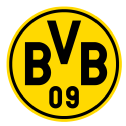
12. Borussia Dortmund
Title odds, per FiveThirtyEight’s SPI: 2%
Title odds, per Caesars Sportsbook: +4500 (implied odds: 2%)
Best characteristic in group play: Defensive resilience (for once)
It’s been an odd first season for Edin Terzic in charge of BVB. Without Erling Haaland, and with an attack remodeled in part around emergency signing Anthony Modeste, this attack- and possession-hungry team has had to adapt a little bit. They’re still dominating possession in reasonably flawed fashion during Bundesliga play, but they easily advanced from Group G with defense.
Despite playing a pair of matches against Manchester City, BVB ranked seventh in xG per shot allowed and, perhaps most impressively, allowed zero transition goals. Their overall possession rate was just 45% — a departure from 56% in league play — and they made it work, hammering Copenhagen at home, taking four points from Sevilla and not only drawing with City once but nearly doing it twice.
Red flag: Can they flip the ‘be assertive’ switch back? Should they?
Adaptability is great, but BVB has been plodding along without a clear identity, and one way or the other, you figure Terzic will need to settle in on something in the months ahead. Or he might still be trying to figure it out when the round of 16 rolls around. That doesn’t seem like a great thing for their chances of advancing further in this tournament.
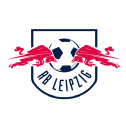
11. RB Leipzig
Title odds, per FiveThirtyEight’s SPI: 2%
Title odds, per Caesars Sportsbook: +7500 (implied odds: 1%)
Best characteristic in group play: Great attackers attacking
An early-season funk nearly derailed RBL’s hopes of both advancing in the Champions League and qualifying for the next one. But in two months in charge, new manager Marco Rose has at least fixed the former thus far. They won their last four group stage matches, handing Real Madrid their first loss of the season in the process.
– Ogden: Leipzig ended Shakhtar’s CL dream, but Ukrainian side are still winners
In their last four CL matches, Christopher Nkunku, Timo Werner, Andre Silva and Dominik Szoboszlai combined for nine goals and five assists among 33 chances created. Full-backs David Raum and Mohamed Simakan provide assistance in attack (Simakan had three assists), but with Xaver Schlager providing cover for the center-backs, RBL have at least somewhat minimized their defensive breakdowns.
Rose didn’t reinvent the wheel, but he has thus far given the good version of RBL more of an opportunity to show itself.
Red flag: They can still make your attackers great, too
Even with Rose in charge for two-thirds of the group stage and things going relatively well, RBL gave opponents too many good looks. Opponents attempted 60% of their shots inside the box (second-most), and 12% of their shots were worth at least 0.3 xG (seventh-most). This appears to be the typical RBL team in all ways good and bad.
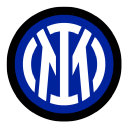
10. Inter Milan
Title odds, per FiveThirtyEight’s SPI: 2%
Title odds, per Caesars Sportsbook: +4000 (implied odds: 2%)
Best characteristic in group play: Their shots were better than your shots
Despite two-thirds of their group stage matches coming against either Bayern or Barcelona, Inter averaged a healthy 0.12 xG per shot (10th out of 32), with 59% of their shots coming from inside the box (third). Opponents? They averaged 0.08 xG per shot with 41% of shots in the box — both were the fewest. And did I mention they played Bayern and Barcelona twice?
Simone Inzaghi’s Nerazzurri ceded both possession (47% possession rate) and control of the pitch (40% of overall touches in the attacking third) but created most of a given match’s good opportunities, often through transition: They scored five goals in what I define as transition possessions — possessions starting outside of the attacking third and lasting 20 or fewer seconds — and allowed none.
Red flag: Passivity
Ceding the field to open up transition opportunities is a strategy as old as the sport itself, and plenty of teams have lifted plenty of trophies because of it. But considering whom Inter would have to beat to make a deep run in the spring, the idea of giving opponents more progressive carries and progressive passes and starting more possessions in the attacking and middle thirds feels like a dicey proposition, especially considering the age of the squad — nine of the 16 players logging more than 150 Champions League minutes are 28 or older.

9. Tottenham Hotspur
Title odds, per FiveThirtyEight’s SPI: 3%
Title odds, per Caesars Sportsbook: +1600 (implied odds: 6%)
Best characteristic in group play: They bogged teams down in midfield
A finishing slump of sorts nearly derailed Spurs’ advancement hopes — Harry Kane attempted 17 shots worth 3.2 xG but scored only once in six matches — but they not only survived but also won their group thanks to a late 2-1 win over Marseille on Tuesday. They averaged just 1.3 goals per match (17th), but their xG differential (+0.6 per match) was 10th-best in the group stage.
– Breaking down the wild finale to Spurs’ Champions League group
The biggest thing Spurs had going for them: They were dominant in midfield. They began 45% of their possessions in the middle third (third-most), preventing teams from advancing into attacking areas and therefore commanding 59% of the overall touches in the box. Midfielders Pierre-Emile Hojbjerg and Rodrigo Bentancur, with help from defender Eric Dier, were too much for Marseille, Eintracht Frankfurt and Sporting CP. We’ll see if that remains the case against better opposition.
Red flag: Dreadful finishing
You could almost look at it as a good thing that they advanced with such minimal contribution from Kane, but they will need the A+ version of Kane to advance in the spring. And with Kane captaining one of the World Cup favorites (albeit an English team mired in a slump of late), he could be adding quite a few matches to his legs in the coming weeks.
Tier 2: Outside picks to win it all
These five teams did enough to advance comfortably despite some lapses (and, in one case, a firing), and, aside from perhaps Benfica, if any of them catch fire in spring and roll to the title, it wouldn’t be particularly surprising.
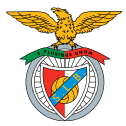
8. Benfica
Title odds, per FiveThirtyEight’s SPI: 3%
Title odds, per Caesars Sportsbook: +5000 (implied odds: 2%)
Best characteristic in group play: Relentless positivity
Last seen leading a swashbuckling PSV Eindhoven team to the Europa League quarterfinals and a near title in the Eredivisie, Roger Schmidt took over a Benfica team suddenly looking for an identity in a much more technical and attack-unfriendly league.
Thus far, it has worked out beautifully. Not only are Benfica unbeaten and distancing themselves in the league race but they were also PSG’s equal in group play, drawing with the French giants twice, matching from an xG perspective and winning Group H on tiebreakers. They ranked fourth in xG per shot and fifth in percentage of shots worth 0.3 xG or more. They attempted far more solo and transition possessions than most of the other top teams here, and, more generally, they just tried stuff. A lot of it worked.
We’ll find out about their staying power in the spring, but they took the fight to both PSG and Juventus and looked great doing so.
Red flag: Protagonists usually don’t win
Solo trips and too many transition attempts can catch up to you eventually, especially if you aren’t Manchester City or Bayern from an overall talent perspective. Typically, underdogs have to play a more reactive style to advance beyond a certain level of the competition. Benfica and Napoli were maybe the two most exciting and enlightening teams to follow in group play, but the journey’s just beginning, and we’ll see how long they can keep up. The longer, the better.
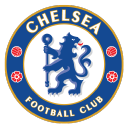
7. Chelsea
Title odds, per FiveThirtyEight’s SPI: 4%
Title odds, per Caesars Sportsbook: +1400 (implied odds: 7%)
Best characteristic in group play: Stinginess
You have to respect the old-school Chelsea-ness of it all. You might be banged up and constantly in need of tinkered lineups. You might have already driven your old manager out and brought in a new one (Graham Potter). You might still be trying to find your footing under new ownership. But if your opponents can’t score, you can’t lose.
After the initial loss to Dinamo Zagreb, Chelsea allowed three goals in five matches to clinch advancement. Heading into the final matchday, they ranked first in shots allowed per possession (0.08) and seventh in xG allowed per shot (0.09). There were at least two defenders between shot and goal for 89% of opponents’ attempts (second), and no team allowed fewer shots from transition possessions. This was nearly Mourinho-era stinginess.
Red flag: Opponents were nearly as stingy
As solid as they were in defense, they were equally inconsistent in attack. Through five matches, they ranked 15th in shots per possession (0.15) and 23rd in xG per shot (0.10), with only 6% of their shots generating 0.3 xG or more (21st). They picked up the pace as the competition went on, scoring five goals in two matches against AC Milan, but they have battled similar inconsistency in Premier League play. Potter has a bit more time to experiment and find his optimal lineup, but doing so is a necessity.
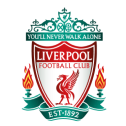
6. Liverpool
Title odds, per FiveThirtyEight’s SPI: 7%
Title odds, per Caesars Sportsbook: +800 (implied odds: 11%)
Best characteristic in group play: They dominated transition
Set pieces, too. Liverpool scored seven goals in transition possessions (no one else scored more than five) and allowed just one. They also scored a tournament-best six set-piece goals from nearly five shots per match, while opponents scored none.
Transition and set pieces are two of the most opportunistic phases of the game, and while Jurgen Klopp’s Reds have struggled to establish traction in Premier League play, their performances in the Champions League — after the shock-and-awe of their initial 4-1 loss to Napoli, anyway — suggested that their overall form isn’t too far off from their normal standard.
Red flag: Opponents didn’t need transition to create great looks
Playing 180 minutes against the Napoli wrecking ball is going to impact your defensive numbers, but it’s still interesting that, despite offering almost nothing in transition, Liverpool allowed opponents to average 0.13 xG per shot, ninth-worst in the competition. As Premier League foes have found, you can break them down in ways you couldn’t previously. Klopp could find his optimal lineup between now and February — and we’ll see whom they add in the January transfer window — but they were somewhat lucky to allow only six goals in the group stage.
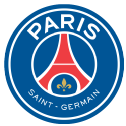
5. Paris Saint-Germain
Title odds, per FiveThirtyEight’s SPI: 8%
Title odds, per Caesars Sportsbook: +650 (implied odds: 13%)
Best characteristic in group play: Push, push, push
Leo Messi has begun to look like (the latest evolved version of) Leo Messi again. Neymar is playing his best ball in many years. Kylian Mbappe remains Kylian Mbappe. The midfield, bolstered with youth in the offseason, has energy again.
There were some attention span issues in October, but PSG still cruised to qualification, and they did so with, to use American football parlance, a relentless ground game. They attempted 605 carries (first) and completed 113 progressive carries (second) per match. And while teams are often led in carries by central defenders pushing into the empty space in front of them, PSG did it from the front: Neymar completed 94 progressive carries — more than anyone else in the group stage despite playing in just five of six matches — while midfielder Marco Verratti (83) was second and Mbappe (80) was third.
Overall, they pushed the ball into dangerous areas, then put it in the net: the Mbappe-Messi-Neymar trio combined for 13 goals and nine assists from 38 chances created. And neither Messi nor Neymar played in every match.
Red flag: No big chances somehow
As we learned in last year’s Champions League final, singular huge chances are worth their weight in gold in a knockout competition, and while PSG’s attacking numbers were mostly unassailable, it’s worth noting that only 5% of their shot attempts were worth 0.3 xG or more. Only eight teams created a lower percentage, and only one of those teams advanced in the competition.
0:55
Janusz Michallik reacts to Real Madrid’s comfortable win over Celtic to top Group F in the Champions League.
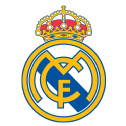
4. Real Madrid
Title odds, per FiveThirtyEight’s SPI: 8%
Title odds, per Caesars Sportsbook: +1100 (implied odds: 8%)
Best characteristic in group play: They created chances at will
After creating some adversity for themselves early in last season’s eventual title run, the defending champs made things easy for themselves this time, winning their first three matches and clinching advancement quickly. They did it primarily with wave after wave of close-range shots.
Real Madrid not only averaged 0.24 shots per possession (second to only Manchester City) but also attempted 59% of their shots in the box (fourth). They also averaged 3.8 shots per match on set pieces, well ahead of everyone else but Liverpool. Their actual scoring numbers were merely fine, in part because of a brief finishing slump from Ballon d’Or winner Karim Benzema (14 shots, 1.5 xG created, zero goals), but it’s difficult to worry too much about this “create tons of excellent looks for your ridiculously talented attackers” plan.
Red flag: They relied too much on Real Madrid Magic
They were tied with RB Leipzig until the 80th minute in matchday two before scoring twice. They were trailing Shakhtar until the fifth minute of second-half stoppage time in matchday four until Antonio Rudiger came through with a bloody header to tie.
Their goal differential in the first 60 minutes was a mediocre +0.2 per match until their blowout of Celtic on the final matchday, but it rose to +0.8 in the final 30. They basically rode this recipe to a Champions League win last year, but it’s an approach that can let you down at inopportune times.
Tier 1-A: The most dominant, most fun team
We’ll grant honorary top-tier status to maybe the most purely dominant team of these six matches, one that got younger, cheaper and much, much better (and more fun) this offseason.

3. Napoli
Title odds, per FiveThirtyEight’s SPI: 5%
Title odds, per Caesars Sportsbook: +1200 (implied odds: 8%)
Best characteristic in group play: Perfection in the attacking third
Perhaps no team in Europe is in better form than Luciano Spalletti’s Azzurri, who had won 13 matches in a row in all competitions — and hadn’t lost since last April — before their meaningless 2-0 defeat to Liverpool on Tuesday. They were ruthless in the group stage, scoring at least three goals in every match until Tuesday.
– Karlsen’s Champions League breakout XI: Kvaratskhelia, Diogo Costa, more
New additions Giovanni Simeone (Hellas Verona), Khvicha Kvaratskhelia (Dinamo Batumi), Giacomo Raspadori (Sassuolo) and Andre-Frank Zambo Anguissa (Fulham) combined for 11 goals and eight assists from 20 chances created, and Napoli ranked both third in shots per possession (0.19) and first in xG per shot (0.15) with 13% of their shots generating 0.3 xG or more (second). And again: That’s with a shutout loss in their meaningless final match! Napoli were a must-watch, and the longer they remain in the competition, the better.
Red flag: They give the ball up a lot in dangerous areas
If you want to know how Napoli will likely be eliminated from the competition, note some giveaway numbers: Opponents began 9% of their possessions in the attacking third (11th-most) and 46% in the middle third (fifth-most). Napoli were so delightful in the attacking third that it perhaps distracted us from the fact that opponents were creating more touches there than they were.
Tier 1: OK, it’s probably going to be one of these two teams winning it all
We end with the two teams that began the competition as co-favorites and have given us no reason to remove them from that perch since the season began.
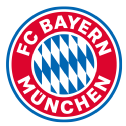
2. Bayern Munich
Title odds, per FiveThirtyEight’s SPI: 24%
Title odds, per Caesars Sportsbook: +450 (implied odds: 18%)
Best characteristic in group play: No one controls the middle more
No one controls the group stage more, too. Despite playing in the perceived group of death with Inter and Barcelona, Bayern swept their six matches for the third straight season. They did it in Bayern fashion, seizing control of matches quickly (average time of first goal: 23rd minute) and creating high-quality chances nonstop.
As far as best characteristics go, however, “They’re Bayern” didn’t really do it for me. So let’s focus on something unique: No one dominated the middle of the pitch like the German champs. They attempted just 9.7 crosses per match (second-fewest to only Shakhtar), their average possession width was just 32.8 meters (fourth-lowest), and 30% of their touches in the attacking third came from the middle third of the pitch (third-highest). That’s also where nine of their 15 assists and 48 of their 82 chances created (six from Sadio Mane, five each from midfielders Leon Goretzka and Joshua Kimmich) came from. If you can’t stop Bayern from coming at you right up the guts, you can’t stop Bayern.
Red flag: Their shots were a little too accurate
It’s worth pointing out that while they ranked fourth in xG per shot, they ranked a distant first in putting 49% of their shots on target. Meanwhile, opponents did so with only 28% of their shots, second-lowest. They are obviously one of the co-favorites no matter what, but that ratio will almost certainly shift in the spring.
0:22
Pep Guardiola praises Rico Lewis after he became the youngest player to score on his first Champions League start.
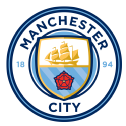
1. Manchester City
Title odds, per FiveThirtyEight’s SPI: 25%
Title odds, per Caesars Sportsbook: +190 (implied odds: 34%)
Best characteristic in group play: They remain the best passing team on the planet
In other words, they remain Pep Guardiola’s Manchester City. They enjoyed a 66% possession rate (highest in the group stage), engineered 80% of their matches’ touches in the attacking third (first), completed 91 progressive passes per match (most) and allowed just 24 progressive passes per match (fewest). No one suffocates their opponents and the match itself like the Sky Blues.
Red flag: Not enough high-quality shots?
While the addition of Erling Haaland earned plenty of headlines and created a focal point in attack for City — he scored five of their 10 goals in the four matches he played — it’s interesting to note that while they ranked seventh in xG per shot, they also created only 50% of their shots in the box, 19th. Most other primary contenders topped that, and teams such as Bayern, Napoli, Liverpool and PSG put more of their shots on target and scored more.
– Rico Lewis, 17, breaks Benzema’s Champions League record
We can quibble with the quality of each team’s groups or the number of packed-in defenses each team saw, but even in Premier League play, City’s attack hasn’t really improved with Haaland — they’ve scored 37 goals in 12 EPL matches this year after scoring 36 in their last 12 of last season. Maybe having a focal point in tight, important matches will pay off down the line, though?
